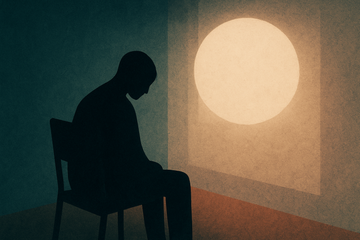The Fear Beneath the Noise
Most people aren’t afraid of silence — they’re afraid of what it reveals.
When the noise fades, when the phone is down, and when there’s no one left to distract you, you meet the part of yourself you’ve spent years avoiding. The truth. The discomfort. The questions that never stopped whispering in the background.
We live in a world that has made distraction the default. Every moment can be filled with something — a sound, a scroll, a task, a person. The idea of being alone has quietly become something people equate with sadness or emptiness. But solitude isn’t loneliness. It’s exposure. And that’s what most people are running from — the raw, unfiltered experience of meeting themselves without escape.
Why Stillness Feels So Uncomfortable
Being alone feels hard because it forces honesty. There’s no performance when you’re alone, no one to validate, no one to impress. Just you, and whatever is left unresolved inside.
Many of us grew up learning to keep busy as a way to feel safe. We confuse productivity with peace. But busyness is a form of avoidance — it keeps you too occupied to feel what’s actually wrong.
When you finally stop, the emotions that were buried start to rise. Guilt, regret, longing, self-doubt. The silence doesn’t create those feelings — it just unmasks them.
If you’ve ever sat in quiet and felt restless or anxious, that’s not proof that solitude is bad for you. It’s proof that there’s something inside of you asking to be seen.
What Happens When You Stop Running
When you stop filling every gap with noise, your mind begins to detox.
At first, it’s uncomfortable — you’ll reach for your phone, crave company, or feel like you’re wasting time. But if you stay, something shifts. You begin to realize that the stillness isn’t empty. It’s alive. It’s where your clarity lives.
In solitude, your thoughts stop colliding and start aligning. You begin to hear the quiet truth of what you actually feel and want. Your intuition grows louder. Your energy stabilizes. You start seeing what’s real — not the version of you that survives the day, but the one that’s been waiting underneath it all.
The world teaches us to chase purpose outside of ourselves, but peace is internal work.
You can’t find clarity in constant noise. You find it in moments of presence — in being alone long enough to listen to what your life is actually trying to tell you.
Learning to Be With Yourself Again
You don’t have to love solitude overnight. It’s a muscle — one that’s been weakened by years of overstimulation and noise. Rebuilding it starts small.
Here’s how you begin:
-
Sit in quiet for five minutes a day. No music, no phone. Just stillness.
-
Notice the discomfort instead of escaping it. Don’t label it. Just observe.
-
Ask yourself what you’re avoiding. The answer will come if you let it.
-
Start journaling instead of scrolling. The things you write down will show you what you’ve been running from.
-
Find peace in simple solitude. A walk. A breath. A moment of nothing.
The goal isn’t to isolate yourself — it’s to reconnect with the self that’s been buried beneath distraction. When you can sit with your own presence and feel at home in it, the noise of the world loses its control over you.
The Truth About Loneliness
Loneliness and solitude aren’t the same thing. Loneliness is the ache of being disconnected — from others, from meaning, or from yourself. Solitude, when practiced intentionally, is the act of rebuilding that connection from the inside out.
Many people think they’re lonely because they’re alone, but often they’re lonely because they’re disconnected from who they are.
When you start spending time with yourself, not in judgment but in understanding, you begin to rebuild that lost relationship. You realize that the company you’ve been seeking has always been your own.
When you can sit alone and feel grounded, you stop needing constant reassurance. You stop chasing validation. You begin to move from a place of calm self-trust instead of fear or scarcity. That’s when solitude transforms from something heavy into something sacred.
How to Make Peace With Yourself
You can’t heal what you refuse to face. But facing yourself doesn’t mean picking apart your flaws — it means meeting them with honesty and compassion.
Sit with your thoughts long enough to understand them. Question your beliefs. Forgive yourself for the versions of you that didn’t know better. Let silence teach you what distraction never could — that you’re not broken, just unlistened to.
If you can learn to be at peace when you’re alone, you’ll stop being afraid of quiet moments. You’ll start to crave them. Because those moments aren’t empty anymore — they’re where your real self finally gets to breathe.
FAQ
Why do I always feel anxious when I’m alone?
Because silence removes the shield of distraction. Your mind finally surfaces the emotions you’ve been suppressing. That anxiety isn’t the enemy — it’s communication.
How do I know if I’m actually healing or just isolating?
Healing solitude feels grounding and clear. Isolation feels heavy and hopeless. The difference is your intention — are you avoiding life or reconnecting with it?
How can I become more comfortable being alone?
Start with small doses of intentional solitude. Create quiet moments and fill them with things that bring you peace — writing, walking, reflecting. Over time, those moments will feel like home instead of punishment.
A Closing Thought from Benevolentia
The world will always offer you noise. It takes courage to choose silence.
When you stop running from your own company, you find out who you really are — and that truth will never abandon you.
- Benevolentia ✨






